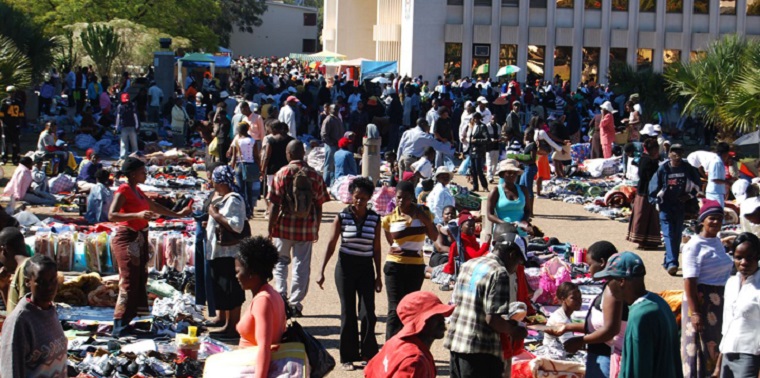By Simba Mswaka
AFRICA is a continent that has always been behind the rest of the world and this position still holds in industries like finance and the movement of money. A large population of the continent do not own bank accounts and have no formal credit records.

Africans use cash as the de facto method of transaction because it has always been the most convenient method of transaction. This has been aided by the slow pace of adjustment that banks have had to their customer’s needs.
In previous years banks focused on acquiring customers that were in full time employment, who had proof of residence and who could afford a minimum deposit, that alone was usually very steep for the average citizen. This meant that those in the informal economy were excluded by these high barriers to entry and therefore they were spectators to the larger economy.
Not having a bank account means no credit history and therefore one cannot access loans and other forms of finance to grow their business or to improve their well-being.
The mobile phone along with the internet is probably the greatest invention of this century. They have both paved ways for things that were previously impossible and therefore the scope of what one can do is endless.
Imagine being able to video call anybody in the world or transfer funds to anyone all from the comfort of your home because of this powerful device. The mobile phone is now an extension of a person because humans now take them everywhere and their whole lives revolve around these mini computers.
Enter mobile network operators and their ability to be able to reach people across the nation by connecting them to their network just by having a mobile phone. These mobile networks have become so powerful because they can reach so many consumers because of their large network effects.
In the case of Safaricom, they built M-Pesa which is a mobile money service that has less regulation than a bank and it has exploded in popularity in East Africa. M-Pesa allows one to perform various financial transactions all from their mobile handset.
The advent of M-Pesa inspired other companies to start providing ancillary services that could work with this platform and banks have seen some of their profits decrease. The financial industry has become more competitive with the advent of this service and the consumer is the major beneficiary of this innovation.
In Zimbabwe Ecocash followed the same model as M-Pesa and once there was a cash crisis in Zimbabwe around 2016 the company began to see exponential growth. This was because users can instantly send money to each other and the recipient can use it without having to go into a bank.
The process of registering an Ecocash account was also easy because mobile users had already registered their sim cards and this was the first step in the KYC (Know Your Customer) process. Ecocash has now become one of the major methods of transaction in Zimbabwe and this will not end in the foreseeable future especially as technology continues to improve and evolve.
Banks are traditional organisations that take eons to make decisions and take far too much time to evolve, Econet exploited this opportunity and created Ecocash. The rest as they say is history.
Fintechs and Crypto
With the advent of mobile money and the opening up of lucrative opportunities for companies in fintech, there has been an explosive mushrooming of Fintech startups across the continent over the last few years. This has only compounded over the last 4 years as more fintechs have entered the African tech ecosystem and there has been more funding into the African start-up ecosystem.
Of the 5 largest funding rounds in 2021, 4 of them are in fintech and the largest was OPay with $400m raised. For even greater context, according to Briter Bridges of the estimated $4.9 billion that was invested in African startups in 2021, 62% of this amount went into fintech companies followed by Health and Biotech and Logistics with 8% and 7% respectively.
The majority of this funding was directed towards fintechs that deal with payments. This clearly shows the large opportunity and the scale of work that needs to be done across the continent.
That being said, it is my belief that payments are the most attractive, why? Well because it is much easier to monetise your model due to being able to take a transaction fee for services rendered. Once the service is rendered a fee is charged and boom there is your income.
Fintech does not only consist of payments, there are other segments such as Insuretech, credit services, remittances and many others. Startups should not only focus on the low hanging fruit as they build their service.
The payments space is also very competitive because the incumbents are not staying still, given the threat to their business. Banks are finding ways to compete with fintechs and in some instances they are looking to acquire them in order to add to their business.
The player in the tech space is crypto currency and the blockchain. Crypto has taken hold in many parts of the world and currently Africa has the largest adoption with Nigeria leading the way. The financial system in Africa is not yet ‘uhuru’ and this presents an opportunity. The Crypto revolution is here and it is not a question of if, but when it will enter the market.
Bitcoin was just something for Techies in 2013 and many believed it was just hype but in 2018 it reached a high of $20 000 per Bitcoin. This was thought to be a bubble and the product has shown its resilience to reach a high of $69 000 in 2021. Bitcoin and Crypto are definitely here to stay.
Given the way Fintech has taken over the continent, it is surprising that there have not been more fintech startups created in Zimbabwe. Especially given the level of distrust between the public and the Zimbabwean banking community. Customers are akin to using the mattress as a bank but this alienates them from the larger formal market where instruments such as loans reside.
A few notable market entrants have been the remittance company SenditToo, Zash and Golix. Golix was a start-up dealing in Bitcoin but has since gone relatively quiet.
With the level of inflation that Zimbabwe has, distrust between customers and banks, slow speed of innovation by banks, a globalised world and the fintech revolution in Africa, the time is right for more fintechs to enter and disrupt the market. This will increase financial inclusion, make banking easier and reduce transaction costs for consumers.
Simba is the Programs and Partnerships Manager of Tech Hub Harare, Future VC, Angel Investor and a Startup Mentor. He can be reached on simbamswaka@yahoo.com , +263777628936 and @DrMswagga on Twitter.







